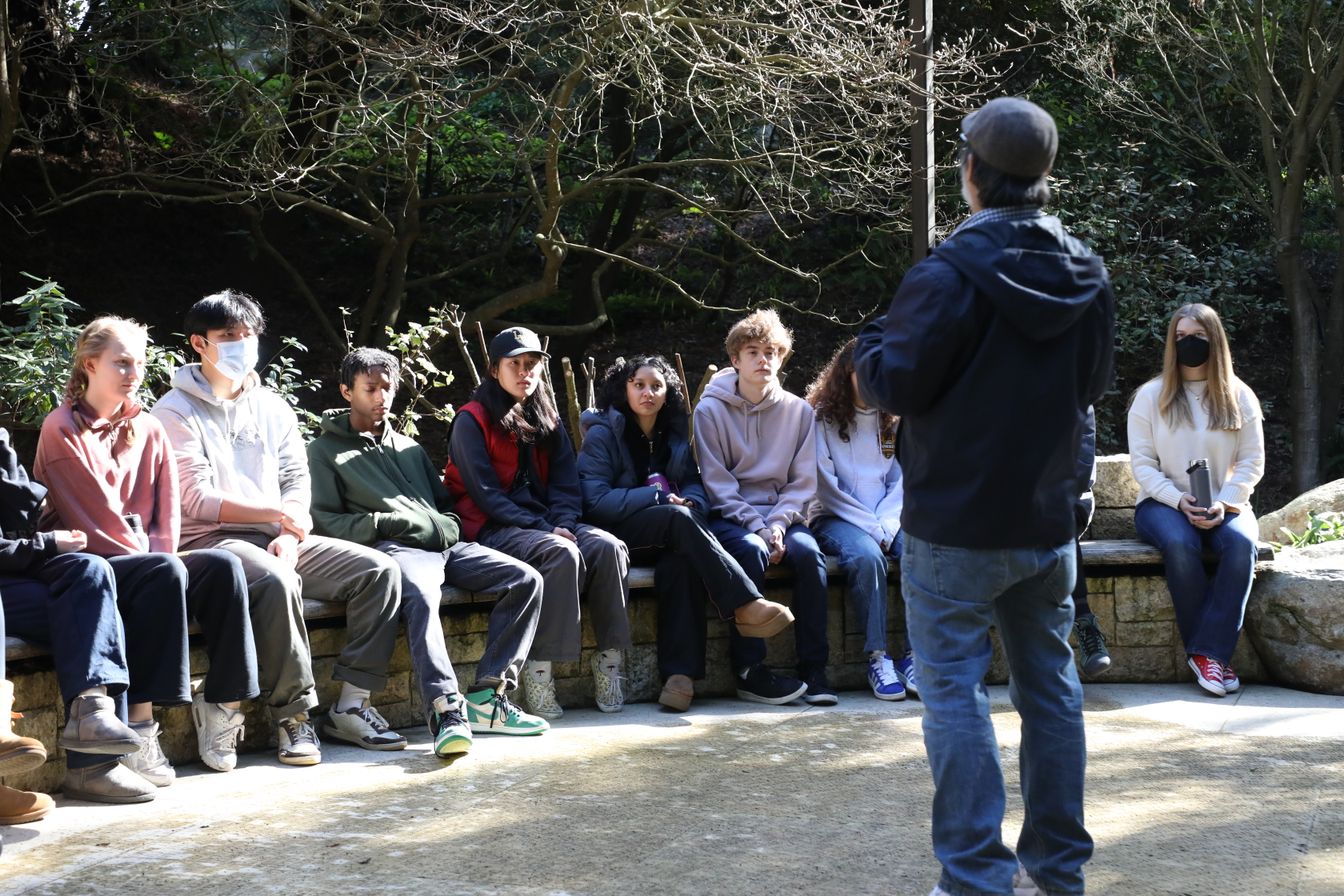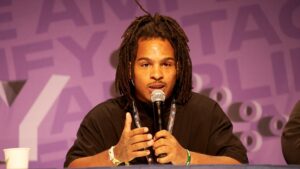Inside the walls of L253, 15 students are taking part in the first-ever “ACT UP, FIGHT BACK: A History of the AIDS Movement” class at Lick-Wilmerding High School. Amongst a course catalog filled with unique English and history Senior Seminars, this U.S. history seminar taught by Alegria Barclay, Dean of Faculty, is the only one with a Public Purpose Program (PPP) component. By learning a whole and comprehensive history of the movement and the tools to enact massive systemic transformation, students will be walking away with more than a letter on their transcript.
Although it is only in its first year at LWHS, Barclay says the idea for her history seminar began a long time ago. “I always like to think about legacy and what the legacy is of those who came before us, especially as someone queer,” she said.
The HIV/AIDS epidemic started in the 80’s with the first documented case in 1981. The peak of the epidemic continued into the early 90s, about a 15-year period. Growing up at the same time as the AIDS crisis and then reflecting back upon its impact and largely unspoken legacy as an adult, Barclay decided it was time for a new generation to learn about the movement.
Prior to LWHS, Barclay has been teaching “ACT UP, FIGHT BACK: A History of the AIDS Movement” for about eight years as an English class at the Nueva School, where she previously worked. Now, in her second year as a part of the LWHS community, she has adapted the class to fit within the PPP curriculum.
Her class is a blend of both traditional and oral history. “We do an overview of queer history from 1880 to 1980. That’s how the course starts to give everyone a grounding of how queer life has been,” she said. “Then it really is just a study of those 15 years [of the epidemic] and what the government response was, what the queer community’s response was, what was happening socially, culturally, politically to have made the crisis.”
Nathan Rivera ’24, a student in the class, describes some of what they have been doing lately in order to gain a deeper understanding of the crisis. So far the class has watched a documentary called How to Survive a Plague, which, centered around AIDS activists, interviews and shows several AIDS activists doing grassroots work. “Recently, even cooler than the documentary itself, we interviewed somebody who was an AIDS activist and was in the movie: Peter Staley,” Rivera said. In addition to interviewing Staley as a class, students have taken a field trip to the AIDS memorial in Golden Gate Park, and Barclay has plans for students to interview AIDS survivors in pairs.
In order to capture the crisis and all of its importance, Barclay’s class has plans to collaborate with Eleanor Sananman’s Cinematic Storytelling PPP class. The class already involved filming interviews, and so in the spring of 2023 Sananman and Barclay discussed forming a partnership, placing the two PPP classes within the same block.
To Sananman, film as a medium holds a special sort of power by “being able to give voice and project out and be a megaphone.” As the semester moves forward, the Cinematic Storytelling class plans to document the interviews between students and AIDS survivors.
The impact that Barclay’s diverse PPP centric curriculum has had on students like Percy Vermut ’24 has been immense. “I think my favorite part has been talking to Peter Staley. It made me cry,” he said. “He was featured in [How to Survive a Plague] which we watched, and then Alegria was like, ‘oh, by the way, like he’s gonna come talk to us.’ I freaked out.”
To students like Maddie Garfinkel ’24, the proximity to the crisis is deeply important to learning. As the first case took place only 43 years ago, there are still countless survivors of the crisis alive today. “You can’t interview somebody from the Revolutionary War,” she said.
On top of the proximity in timespan to the crisis, there is also a geographical proximity to the crisis for students considering that the epidemic greatly affected San Francisco’s LGBTQ+ community, sparking a legacy of activism that lives on today. “[The class] feels so applicable as a queer person who lives in this city. Hearing these organization names and knowing that they still exist, and I could hop in my car and drive to their building, it’s so fascinating,” Garfinkel said.
Historically, queer history has not been taught, both within and outside of the classroom. “Unlike racial history, which can be passed down through generations, queer history often stops and starts with one or two people in a family,” Barclay said. “[Queerness] is not a lineage, and so I think that’s why queer history in some ways is harder to document right. You have to develop the community anew every generation, you’re constantly building and rebuilding.”
Students within the class have also observed their prior lack of education around queer history. “Looking back on it, we do not really talk about queer people in our English classes or history classes. [This class is] the first time we are basically only talking about queer people. It just feels really cool to be represented in the academic setting because otherwise it’s just the affinity spaces,” Vermut said.
Barclay developed her class with an understanding of the lack of education around queer history for students. She said, “I think I have a responsibility as a queer adult to provide spaces for queer kids.”
No matter how they identify, Barclay hopes to leave all students with examples of revolutionary grassroots change. “It’s nice to have a course that in many ways teaches you how to respond to injustice in really powerful ways. I think [Gen Z] is going to face an extraordinary number of crises that will need this level of activism. So it feels great to be like, ‘hey, there’s like a blueprint for how to do this. I’m going to teach it to you and then maybe you’ll use it.’”







Escort Gazette review guide with free verified ads in Europe. Best Escort Girls, Strip clubs, Brothels, Massage parlors on the map. Easy search directory. https://andrepcpb36814.suomiblog.com/best-escort-girls-strip-clubs-brothels-massage-parlors-on-the-map-easy-search-directory-41765994
Escort Gazette review guide with free verified ads in Europe. Best Escort Girls, Strip clubs, Brothels, Massage parlors on the map. Easy search directory. https://deanymyl79035.qowap.com/85902848/escort-gazette-review-guide-with-free-verified-ads-in-europe
Escort Gazette review guide with free verified ads in Europe. Best Escort Girls, Strip clubs, Brothels, Massage parlors on the map. Easy search directory. https://macrobookmarks.com/story17052311/escort-gazette-review-guide-with-free-verified-ads-in-europe
Escort Gazette review guide with free verified ads in Europe. Best Escort Girls, Strip clubs, Brothels, Massage parlors on the map. Easy search directory. https://lanesgtf47025.tokka-blog.com/26512673/escort-gazette-review-guide-with-free-verified-ads-in-europe
Escort Gazette review guide with free verified ads in Europe. Best Escort Girls, Strip clubs, Brothels, Massage parlors on the map. Easy search directory. https://manueljwiu13689.ttblogs.com/5785185/escort-gazette-review-guide-with-free-verified-ads-in-europe
Escort Gazette review guide with free verified ads in Europe. Best Escort Girls, Strip clubs, Brothels, Massage parlors on the map. Easy search directory. https://base-directory.com/listings12682292/escort-gazette-review-guide-with-free-verified-ads-in-europe
Escort Gazette review guide with free verified ads in Europe. Best Escort Girls, Strip clubs, Brothels, Massage parlors on the map. Easy search directory. https://bookmarkusers.com/story16825336/best-escort-girls-strip-clubs-brothels-massage-parlors-on-the-map-easy-search-directory
сумки дорожные на колесах
http://3h.kz/go.php?url=http://dorozhnye-sumki-kolesa.ru